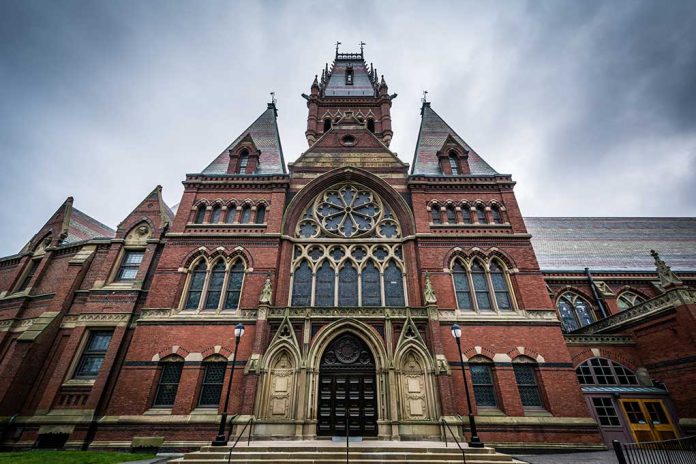
Harvard University faces a potential ban on enrolling foreign students as the Trump administration demands records of misconduct amid national security concerns and accusations of antisemitism on campus.
Key Takeaways
- The Trump administration has frozen $2.2 billion in funding to Harvard University after the school refused to comply with federal demands regarding foreign students.
- Homeland Security Secretary Kristi Noem has demanded Harvard provide records on “illegal and violent” activities of foreign student visa holders by April 30, 2025, or lose its ability to enroll international students.
- Harvard faces potential revocation of its tax-exempt status and has already lost $2.7 million in DHS grants as the administration ties campus antisemitism to foreign student activities.
- Harvard President Alan Garber has defied the administration, stating that “no government should dictate what private universities can teach, whom they can admit and hire.”
- With international students comprising 27.2% of Harvard’s student body, the university stands to lose significant revenue if it loses its SEVP certification.
Harvard Defies Trump Administration Demands
Harvard University has taken a bold stance against the Trump administration by refusing to comply with what it calls unlawful federal demands regarding foreign students. The conflict escalated when Homeland Security Secretary Kristi Noem issued a letter demanding the university provide detailed records on “illegal and violent” activities by foreign student visa holders by April 30, 2025. Harvard’s refusal has prompted immediate financial repercussions, including a freeze on $2.2 billion in multiyear grants and the cancellation of a $60 million federal contract, marking an unprecedented confrontation between the prestigious institution and federal authorities.
Harvard President Alan Garber articulated the university’s position clearly, rejecting government interference in academic affairs. This represents a significant shift for Harvard, which had previously faced criticism for yielding to administrative pressures. The administration’s demands extend beyond foreign student records to include reducing student and faculty governance power and ensuring “viewpoint diversity” across academic departments, requirements that Harvard leadership views as overreach that threatens academic independence and constitutional rights.
National Security Concerns and Antisemitism Allegations
The Trump administration has framed its demands within the context of national security concerns, directly linking antisemitic demonstrations on campus to foreign student activities. Secretary Noem canceled over $2.7 million in DHS grants to Harvard, citing studies that allegedly “disparaged conservatives” and promoted “public health propaganda” about COVID-19. The administration has particularly focused on campus unrest following the October 7, 2023, Hamas attack on Israel, claiming that Harvard’s failure to address antisemitic protests threatens national security and undermines American values.
Homeland Security Secretary Noem said, “Harvard bending the knee to antisemitism—driven by its spineless leadership—fuels a cesspool of extremist riots and threatens our national security, With anti-American, pro-Hamas ideology poisoning its campus and classrooms, Harvard’s position as a top institution of higher learning is a distant memory. America demands more from universities entrusted with taxpayer dollars.”
Secretary of State Marco Rubio has reinforced this position, stating that hundreds of foreign students involved in radical protests have already been deported over the past 18 months. The administration has noted a correlation between elite colleges with high percentages of international students and anti-Israel protests. With 27.2% of Harvard’s student body consisting of foreign students, the university faces substantial consequences if it loses its Student and Exchange Visitor Program (SEVP) certification, which would prevent it from enrolling international students.
Thursday campus antisemitism roundup
Harvard: IRS working on removing tax exempt statushttps://t.co/jYL8oLD5R6Harvard: Harvard’s AAUP withdrew its request for a judge to preemptively block funding freezes from the Trump administration, after the court did not grant their…
— Andrew Pessin (@AndrewPessin) April 17, 2025
Financial Implications and Broader Impact
The financial stakes for Harvard are enormous. Beyond the already frozen $2.2 billion, the university risks losing access to approximately $9 billion in federal grants. Additionally, the Trump administration has instructed the IRS to consider revoking Harvard’s tax-exempt status, a move that would further devastate the institution’s finances. Experts note that despite Harvard’s substantial endowment, those funds are not easily accessible to offset federal funding cuts, placing the university in a precarious financial position should it continue to resist compliance.
Harvard’s president, Alan Garber, said, “No government—regardless of which party is in power—should dictate what private universities can teach, whom they can admit and hire, and which areas of study and inquiry they can pursue.”
Harvard is not alone in facing these pressures. The administration has also frozen or canceled funding for other prominent institutions, including Columbia, Cornell, and Princeton, signaling a broader confrontation with elite universities over issues of campus antisemitism and foreign student oversight. As the April 30 deadline approaches, Harvard maintains it will not surrender its independence or constitutional rights, setting the stage for a high-stakes legal and political battle that could redefine the relationship between the federal government and American higher education institutions.
Sources:
- https://www.axios.com/2025/04/16/harvard-columbia-demands-trump-vision-universities-influence
- https://www.nytimes.com/2025/04/14/us/harvard-trump-reject-demands.html
- https://www.breitbart.com/education/2025/04/16/trump-administration-harvard-must-provide-info-on-foreign-students-misconduct-or-all-will-be-barred/



